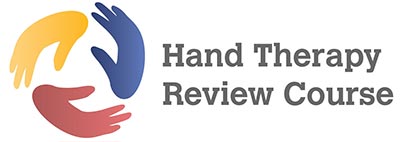
2017 Hand Therapy Review Course - Orange, CA
Friday, February 24, 2017 - Sunday, February 26, 2017
UC Irvine Medical Center - Orange, CA
Day 1: Pre:Course: Foundational Science of the Upper Extremity: An Anatomy and Kinesiology Review
Days 2 and 3: Comprehensive Survey of Hand Therapy Review Course
Day 1 Description
Friday, February 24 (Pre-course)
Foundational Science of the Upper Extremity: An Anatomy and Kinesiology Review
A working knowledge of the anatomy and kinesiology of the upper extremity provides a solid foundation for therapeutic evaluation and intervention. Using classroom-lecture style, this pre course will review the anatomy and biomechanics of each joint and examine the brachial plexus and innervation patterns of the arm and hand.
Day 1 Learning Objectives
At the conclusion of this activity, participants will be able to:
- Create an individual learning plan to address three identified areas of weakness in hand therapy topics.
- Explain interaction betwween boney anatomy, static and dynamic stabilizers, and proprioceptive reflexes necessary to allow pain free range of motion and force transmission across the following joints: digits, thumb, wrist, elbow, and shoulder. .
Friday, February 24, 2017
| Time | Anatomical Sessions | Faculty |
| 11:00-11:30am | Registration | |
| 11:30-11:35am | Introductions | Diane Coker, DPT, CHT |
| 11:35am-12:45pm | Anatomy of the Shoulder and Elbow | Tambra Marik, OTD, OTR/L, CHT |
| 12:45-2:00pm | Brachial Plexus and Upper Extremity Innervations | Nora Barrett, OTR/L, CHT |
| 2:00-2:30pm | Snack Break | |
| 2:30-3:15pm | Anatomy of the Forearm and Wrist | Diane Coker, DPT, CHT |
| 3:15-5:15pm | Anatomy of the Hand | Diane Coker, DPT, CHT |
| 5:15-5:30pm | Q & A |
Days 2 and 3 Description
Saturday, February 25 and Sunday, February 26
Comprehensive Survey of Hand Therapy Review Course Description
This course is designed to provide a comprehensive review of the evaluation and intervention processes pursued for typical diagnoses in upper extremity rehabilitation. Advanced clinicians will describe fundamental concepts, clinical reasoning, and evidence to provide a multi-faceted approach to the hand therapy process. Adjunctive methods for intervention will be analyzed as a means to facilitate outcomes, and expert panels will be offered throughout the weekend to allow a high level of attendee-faculty interaction via discussion panels.
Days 2 and 3 Learning Objectives
At the conclusion of this activity, participants will be able to:
- Design appropriate treatment plans for patients with four common upper extremity peripheral nerve diagnoses including ulnar neuropathy, median neuropathy, and radial neuropathy and upper brachial plexus injuries.
- Create custom treatment plans for patients with three discrete levels of crush or blast injuries: Finger level, wrist level, distal forearm level injury.
- Justify clinical application of three physical agents for patients with upper extremity diagnoses.
- Determine how to modify hand therapy protocols for the following conditions: hand fractures (phalangeal, metacarpal), wrist fractures (carpal or distal radius), and tendon injuries (flexor or extensor injuries).
- Discuss three discrete patterns of wrist instability using patient history, symptoms, diagnostic testing, and clinical special testing.
- Propose an appropriate treatment plan including orthosis and safe exercise progression for 90% of patients with Triangular Fibrocartilage Complex injuries and ulnar wrist pain.
- Design a custom program considering post-operative limitations for each patient after arthroplasties, including one each of the following procedures: shoulder reverse or traditional arthroplasty, elbow total arthroplasty, wrist total arthroplasty, thumb carpometacarpophalangeal interposition arthroplasty and index, middle, ring, and small digits metacarpophalangeal and proximal interphalangeal arthroplasty.
- Identify two appropriate rehabilitation goals and three interventions to promote post-operative healing and recovery of function in the spectrum of three conditions of rotator cuff injury (tendinitis, tendinosis, and rotator cuff tear), and two instability conditions of the shoulder (traumatic unidirectional and atraumatic multidirectional).
Saturday, February 25, 2017
| Time | Topic | Faculty |
| 7:30-8:00am | Registration and Continental Breakfast | |
| 8:00-8:05am | Introductions | Diane Coker, DPT, CHT |
| 8:05-9:05am | Evaluation of the Upper Extremity | Audra Ponci Bado, MPT, OCS, CHT |
| 9:05-9:35am | Principles of Soft Tissue Healing | Christina Schmidt, OTR/L, CHT |
| 9:35-9:50am | Coffee Break | |
| 9:50-10:50am | Shoulder Diagnoses and Treatment | Tambra Marik, OTD, OTR/L, CHT |
| 10:50am-12:00pm | Elbow Diagnoses and Treatment | Tambra Marik, OTD, OTR/L, CHT |
| 12:00-1:00pm | Lunch | |
| 1:00-2:00pm | Multi-trauma and Complex Injuries | Nora Barrett, OTR/L, CHT |
| 2:00-3:00pm | Peripheral Nerve Injuries | Nora Bareet, OTR/L, CHT |
| 3:00-3:30pm | Snack Break | |
| 3:30-5:00pm | Physical Agents | Alessia DiGennaro Kerner, OTR/L, CHT |
| 5:00-5:30pm | Q & A |
Sunday, February 26, 2017
| Time | Topic | Faculty |
| 7:30-7:45am | Registration and Continental Breakfast | |
| 7:45-8:15am | CHT Exam Preparation | Diane Coker, DPT, CHT |
| 8:15-9:15am | Fractures | Linda deHaas, MPT, OCS, CHT |
| 9:15-10:15am | Flexor Tendon Rehabilitation | Joanne Mimm, MPT, CHT |
| 10:15-10:45am | Coffee Break | |
| 10:45-11:45am | Extensor Tendon Rehabilitation | Christina Schmidt, OTR/L, CHT |
| 11:45am-12:30pm | Tendon Transfers | Joanne Mimm, MPT, CHT |
| 12:30-1:30pm | Lunch | |
| 1:30-2:30pm | Wrist Biomechanics and Instabilities | Elizabeth Byrne, MPT, OCS, CHT, ATc |
| 2:30-3:30pm | Ulnar Sided Wrist Pain and Salvage Procedures | Elizabth Byrne, MPT, OCS, CHT, ATc |
| 3:30-4:00pm | Snack Break | |
| 4:00-4:45pm | Arthritis & Joint Reconstruction | Vicky Adams, OTR/L, CHT |
| 4:45-5:30pm | Ligamentous Injuries & Tendinopathies | Stephanie Djang, MPT, CHT |

